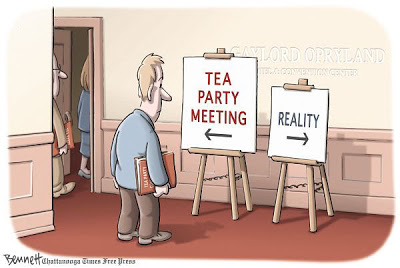Fact and fiction:
Cultural cognition and today’s politics
The scholars have noted a tendency for people to ‘conform their beliefs about disputed matters of fact… to values that define their cultural identities.’
By Don Swift | The Rag Blog | June 28, 2012
Most of us have lists of recent misstatements of fact by people in the political arena. The words of the Birthers and those who rant about Barack Obama being a Muslim and a socialist are on all of our lists.
Mitt Romney has added many outright falsehoods to my list. Three of them are (1) that Obama made things much worse, (2) that Obama follows economic policies he knows cannot work, and (3) that Obama has accelerated the rate of federal spending.
There are many more, and they usually go unchallenged — in part because reason and facts are playing a much smaller role in our politics.
Scholars connected with the Cultural Cognition Project centered at Yale study “how cultural values shape public risk perceptions and related policy beliefs.” Their work builds on Mary Douglas’ and Aaron Wildavsky’s studies of how cultural factors influence people’s perceptions of societal risks.
The Cultural Cognition Project scholars have noted a tendency for people to “conform their beliefs about disputed matters of fact… to values that define their cultural identities.” In a sense, people tend to shop for information and misinformation that is consistent with their values and identities.
Perhaps the most alarming illustration of this tendency is the growing body of Americans who let their cultural values dictate opinions about matters of scientific fact, particularly in the growing denial of human involvement in global warming.
It was found that people with egalitarian and communitarian values were more receptive to troubling information about climate change than those who esteemed individualism and hierarchy. The latter were very receptive to information that denied the dangers of climate change. People, especially those with strong group identities, have a strong desire for culturally congenial beliefs. This is why those who supply misinformation are so successful.
Psychologist Jonathan Haidt wrote that “our minds contain a variety of mental mechanisms that make us adept at promoting our group’s interests in competition with other groups.” The earliest humans survived not so much by reasoning as by clinging to the group, tending to be good team players.
Psychologists talk about “motivated reasoning,” which Dan Kahan at Yale describes as “when a person is conforming their assessments of information to some interest or goal that is independent of accuracy.”
At Stanford an experiment was performed where conservative subjects were told about a generous welfare proposal and were told it was a Republican plan. The opposite was done with liberal subjects. Both test groups tended to identify with plans that were ascribed to their reference groups. Increasing polarization probably magnifies this tendency to assess proposals on this basis rather than on a purely policy basis, separate from considerations of partisan identity.
Recent years have also seen a growing inclination to treat misinformation as being as respectable as facts. One reason the United States has entered a period of non-factual politics is that so many people let their identities get entangled with clearly false information. People have a way of reinforcing their cultural identities in this manner.
People have always let their normative biases be shaped by their political and moral identities. But what is occurring now represents an extreme case, and the moral and political identities for many have now merged. It is noted that people seem to be given to “misfearing” — exaggerating threats and seeing some that may not exist. In a highly fragmented society besieged by multiple crises, many are more likely to cling to their cultural identities and feel hostile to those who do not share their views.
David Hoffman has noted data from a recent Pew poll that shows that party affiliation is increasingly a reliable and strong predictor of cultural values. He sees in progress a partisan-realignment developing along value dimensions that has been in progress since 1987. Increasing political polarization has produced an “illiberal form of expressive politics” in which reason is devalued and in which it becomes more difficult for people to reason together.
These writers are conducting careful studies to see how the concept of cultural cognition relates to the broader realm of cultural theory. They are also considering ways to manage cultural cognition for the good of society. That is to say, they are interested in finding ways where people with different cultural perceptions on matters such as global warming, gun control, and handling nuclear waste can converge on shared beliefs and work toward policies that benefit all.
The concept of cultural cognition seems particularly valuable for understanding the super-heated politics of 2012, a time when government is gridlocked and fact and reasoned argument seem to have a very small place in the national political arena.
There have been somewhat similar times in the past. High emotion and willingness to believe some pretty tall tales marked the Know Nothings of the 19th century. The abolitionists and southern Fire Eaters and Secessionists showed little disposition to reasoned discourse and were not inclined to sit down and reason together. The politics of the late 19th century were often marked by considerable ethnocultural conflict and cultural cognition and high degrees of emotionalism were sometimes present.
Since the rise of the New Right, American politics has been marked by extraordinary levels of vitriol and emotion. These undesirable characteristics have been accompanied by a much greater tendency to make unsupported assertions and even outright falsehoods. With the appearance of the Tea Party movement in 2009, these tendencies have almost become the defining characteristics of American politics.
The levels of paranoia, rage, and vitriol have been greatly ramped up. Hyperbole, falsehoods, and unsupportable claims have become so commonplace that few in the media bother to correct them or note that they are in any way unusual. They are treated as being just as legitimate as positions grounded in reason and fact. The level of irrationality seems high, large numbers of people believe really absurd things, such as that Barack Obama was born in Kenya.
The kind of political emotionalism we observe today has been ascribed to past “creedal passion periods.” George F. Will, a leading conservative pundit, explained that, with the appearance of the Tea Party, the nation had come into another “creedal passion period.”
He noted that the late Samuel P. Huntington who developed that term had identified four other creedal passion periods in American history, and Will pronounced the present period the fifth. In Wills’ interpretation, the creedal passion is all about returning to first principles, and he noted that Huntington believed that “the distinctive aspect of the American creed is its anti-government character.”The concept of cultural cognition is certainly consistent with that of the “creedal passion period.”
The premier social scientist Samuel P. Huntington attempted to explain why American politics have sometimes been marked by periods of intense emotions which have taken precedence over the usual interest group politics. They interrupt the normal “pattern of political continuity and equilibrium.”
Huntington saw periodic intrusions of “passion, moralism, intensified conflict, reform, and realignment.” These have occurred in roughly 60-year cycles. Hunnington thought there were four of these “creedal passion moments”: the American revolution, the Age of Jackson, the Progressive Era, and the 1960s.
These outbursts of emotional and moralistic energy have occurred because Americans periodically want to narrow the distance between American ideals and realities. They are outraged by what they perceive as outright corruption and also serious failures to live up to American ideals. Writing for The Guardian in 2011, Michael Weiss also saw the Tea Party as a creedal passion movement and added that it was already in decline. This was written before that Republican faction tied the House of Representatives up in knots over the budget and extending the national debt ceiling.
These moral energies have their roots in the English Revolution of 1688 and America’s strong Protestant heritage, which Huntington thought shaped what America is all about. He granted that the Anglo-Protestant heritage positively interacted with the 18th-century Enlightenment ideas that the founders came to revere. The first two American Great Awakenings also generated moral forces that were to underpin American political life.
Hunnington believed that the United States can contain the energies unleashed by creedal passion periods and come through them improved and stronger because there is such widespread agreement on American ideals. By contrast, Huntington did not think these moralistic creedal passion periods could occur in Europe, where there was class conflict and powerful ideological divisions.
Huntington noted that creedal passion moments were marked by unrealistic expectation of moral perfection and that this outlook got in the way of practical solutions. Nevertheless, he saw results that could be labeled as democratic and reformist. For the most part, he saw people on the Left as being passionate and often harboring unrealistic expectations and demanding too much.
Huntington did not live long enough to see the Tea Party movement. In his last days, he expressed concern that the United States was experiencing an identity crisis, and he was very concerned that the nation’s culture and creed must remain firmly rooted in Anglo-Protestantism.
His creedal passion moments were about reaffirming first principles, and those, he thought, were the Protestant values of the nation’s founders. The Harvard scholar saw three forces threatening the nation’s traditional values and identity: (1) multiculturalism, which he thought could undermine civic education, (2) “transnationalism,” the tendency of leftists and corporate executives to see themselves as citizens of the world, and (3) the “Hispanization of America.”
He feared that the United States “could evolve into a loose confederation of ethnic, racial, cultural, and political groups.” Huntington was correct that many Americans shared his concerns about growing cultural pluralism. He was no nativist, but many who did worry about the nation’s changing character and identity probably were not on his lofty level.
When the Tea Party erupted in 2009, its members were often strongly anti-immigrant and also hostile to African Americans. Clearly, concerns about a changing American identity contributed to the coming of the Tea Party.
Whether it is just the latest creedal passion movement is another matter. Huntington wrote that the previous creedal passion periods produced reformist, liberal, and democratic results. They brought the nation more in line with its historical ideals.
Perhaps the answer to this question depends upon the definitions one employs. It is difficult to find democratic and liberal elements in the Tea Party movement. There is a far greater unwillingness to compromise than found in participants in previous creedal passion periods. Nativism, xenophobia, and anti-black attitudes have deep roots in American history; but they are not the nation’s first principles. The presence of so much violent rhetoric might suggest a parallel to our revolutionary ancestors or the most extreme Locofocos in the 1830s.
A troubling part of the effort at comparison is that the Tea Party’s notion of traditional Americanism is so remote from reality and the nation’s past. Its constitutional theory is far removed from modern constitutional history and resembles the extreme claims of southern secessionists in the mid-nineteenth century. Their economic and social views — unrestrained, raw capitalism and Social Darwinism — seem to be a throwback to a disgraceful period in American history, the Age of the Robber Barons.
Many writers have classified the Tea Party movement as a right-wing populist movement. This is the same classification accorded the Religious Right, and broader New Right. Both are given to conspiracy theories and emotional rhetoric. Both claim to speak for the true majority and maintain that they are battling an established “elite.”
A problem with this classification of the Tea Party as populist is that populism is related to status theory and it usually applies to an aggrieved class or cultural group. If it is economic or left-wing populism, it describes a class or classes.
The Tea Party movement has to do with national identity and the perception that the nation is in decline or facing severe crisis. It is not about identifiable classes or a particular cultural group. However, careful classification is difficult because it energizes many resentments and romanticist impulses around its core of anti-tax, anti-government, and anti-modern goals.
Historical comparisons are useful, but it could be that the extremism that has overtaken the Republicans exceeds that found in past situations. Michael Stafford, a syndicated columnist, wrote that a form of “political rabies” has infected the Republican Party, and he has decided to leave it.
At the time he wrote that column, the Montana Republicans were holding their state convention. Outside the building was an outhouse called “Obama’s Presidential Library.” Inside was the alleged birth certificate of “Barack Hussein Obama,” which was stamped with words that mean cow or bull droppings. On the wall under “For A Good Time” were the names and fake phone numbers of Michelle Obama, Hillary Clinton, and Nancy Pelosi.”
The Democrats have become more partisan than they were, but they have not moved dramatically to the left, nor have they adopted a bevy of strange arguments that defy rational explanation. The cultural cognition argument partly explains what seems to be Republican group think, but it does not fully explain the drift to extremism and the political rabies Stafford describes.
The answer probably lies in the fact that so many Republicans feel deeply threatened by cultural change and the emergence of a pluralistic, multicultural America. Of course, the threats of terrorism and economic decline effect all Americans.
In future articles Don Swift will discuss how scholars have dealt with high levels of emotionalism and irrationality in American politics.
[Don Swift, a retired history professor, also writes under the name Sherman DeBrosse. Read more articles by Don Swift on The Rag Blog.]




















